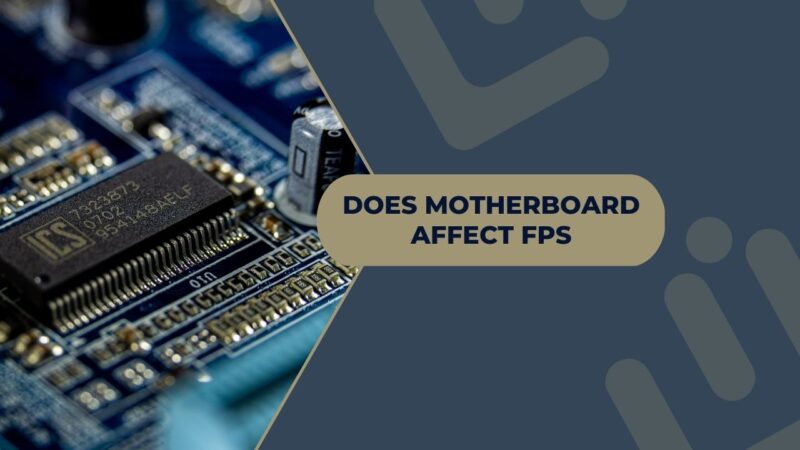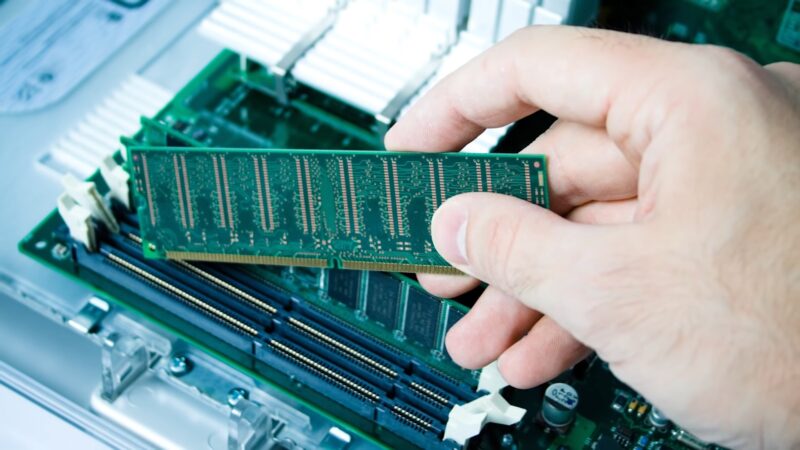The answer to this question is a little complicated. On the one hand, the motherboard does not directly impact the FPS. However, the quality of the motherboard can indirectly affect the FPS.
For example, a lower-quality motherboard may not be able to properly handle the data that is being sent from the CPU to the GPU. This can lead to lower FPS.
The type of chipset, CPU and other features will influence the gaming performance and frame rate. However, the most important factor is still the graphics card.
What Is The FPS, And How Does It Works?
FPS stands for “frames per second,” which measures how many images your computer can display per second.
The higher the number, the smoother the image will appear. Anything above 24 FPS is considered acceptable for gaming.
What Is A Motherboard?
A motherboard is the main circuit board of a computer. It is also known as the mainboard, system board, or logic board.
The motherboard connects all a computer’s parts together, containing internal and external peripherals components.
It is where the CPU, memory, and other components are plugged in. The motherboard is the most important part of a computer.
Does A Motherboard Affect Gaming Performance?
The motherboard is the backbone of any computer. It houses the central processing unit (CPU), the Random Access Memory (RAM), the hard drive, and other essential components.
The motherboard is what allows all these different parts to communicate with each other. It is the nervous system of the computer.
While the motherboard does not directly affect performance, it is an important factor in overall system performance.
A high-quality motherboard can provide better support and stability for high-end components, which can, in turn, improve performance.
Conversely, a poorly made or outdated motherboard can bottleneck other components and drag down performance. Therefore, when choosing a motherboard, it is important to consider compatibility with others.
Before we understand, Does Motherboard Affect FPS? We must know about ;
Does CPU Or GPU Affect Performance?
1. CPU:
A CPU, or central processing unit, is the brain of a computer. It handles all the instructions a computer receives and carries out the commands.
So, a CPU affects performance in many ways. A faster CPU can process more instructions in a given time, leading to quicker load times and better overall performance.
And, a CPU with more cores can multitask better, meaning it can handle more than one program at a time without slowing down.
No matter how good your graphics card is, you won’t be able to enjoy the benefits of high frame rates if your CPU can’t keep up.
A powerful processor is essential for achieving high frame rates in games. If you want to improve your gaming performance, upgrading your CPU should be your first step.
A CPU affects the performance of FPS, or frames per second, in a computer game because it has to process all of the game’s data. A faster CPU can result in a higher FPS.
If your CPU is so slow that your GPU utilization is around 40 to 50 percent despite 100 percent CPU utilization, Then your gaming experience will be as usual.
2. GPU:
A graphics processing unit (GPU) is a computer chip that performs rapid calculations and is used to display images on a screen. It can be used for various applications, from video games to CAD software.
GPUs can be integrated into a computer’s motherboard or be a separate card that plugs into the motherboard. So, does a GPU affect the performance of FPS?
The answer is yes, but to what extent depends on the game and other factors. For example, a GPU can affect FPS in games more reliant on graphics, such as first-person shooters.
Other games, such as those in the strategy genre, may not be as affected by the GPU.
Some gamers believe that a GPU can affect the performance of their favorite games, precisely the number of frames per second (FPS) that their computer can display.
While a GPU can affect FPS, a variety of other factors can impact game performance. For example, the game itself may be poorly optimized, or your computer may not meet the minimum system requirements. However, a GPU is not the most critical factor in FPS.
Do You Require A Powerful Motherboard For Gaming?
Whether or not you require a powerful motherboard for gaming depends on a few factors. First, what kind of games are you looking to play?
If you’re interested in playing the most demanding games on the market, you’ll need a powerful motherboard that can support all necessary components.
However, if you’re only interested in playing less demanding games, you might get by with a less powerful motherboard.
Additionally, it’s important to consider what other components you’ll be pairing with your motherboard.
If you have a powerful graphics card, for example, then you won’t need as powerful of a motherboard to get the most out of your games. Ultimately, it comes down to
No, you don’t require a powerful motherboard for gaming. A mid-range motherboard will be more than enough for most gamers. You will only need a powerful motherboard if you plan to do some serious overclocking.
Best Motherboard For FPS:
There are a few important things to remember when shopping for the best motherboard for FPS gaming:
- The motherboard must be compatible with your CPU and GPU or plan to purchase.
- The motherboard should have enough RAM slots to support the amount of memory you need.
- The motherboard should have enough PCI Express (PCIe) slots to support all of your graphics cards.
Some brief descriptions are;
- Overclocking Power
- RAM and Expansion Slots
- The BIOS
1. Overclocking Power:
Overclocking your CPU is a great way to improve your PC’s performance, but if you want to get the most out of your system, you need a good motherboard.
Here are our picks for the best motherboards for overclocking for both Intel and AMD systems. If you want to overclock your CPU, you need a good motherboard.
Motherboards are an important part of any computer build, and when it comes to FPS gaming and overclocking, there are a few key things to look for in a good motherboard.
The best motherboard for FPS gaming and overclocking will have plenty of room for expansion, ample overclocking headroom, and top-tier features and build quality.
2. RAM And Expansion Slots:
Adding more RAM to your computer can often help improve FPS in games.
If you’re looking for the best motherboard to support faster RAM speeds and more expansion slots for upgrading in the future, the ASUS ROG Maximus XI Hero is a great option.
It supports up to 64GB of DDR4 RAM at speeds up to 4133MHz and has three M.2 expansion slots to add even more storage. Its USB 1 Gen 2 ports offer fast data transfer speeds for gaming peripherals.
3. The BIOS:
The ASUS ROG Strix Z390-E Gaming Motherboard is the best motherboard for FPS gaming. It has everything you need to get the most out of your gaming PC, including superb build quality, top-notch performance, and great features.
The Strix Z390-E Gaming is also one of the most modern gaming motherboards on the market, with a sleek black and red design that will make your gaming rig look great.
How to Increase FPS on a PC
If you’re experiencing low fps on your PC, consider upgrading your graphics card. You can also upgrade other components, but if you already have decent hardware, it’s time for some performance optimizations.
What do I mean by optimizations? This involves fine-tuning the software of your PC to prioritize gaming performance.
The first step, which I’ve already mentioned, is keeping your drivers up-to-date. Failing to update your drivers can lead to stuttering and frame drops in your games.
Next, optimize the in-game settings. The specific settings you’ll need to adjust depending on the game you’re playing. For example, if you’re playing Tom Clancy’s Ghost Recon and experiencing stuttering, lags, and fps drops, you’ll need to fine-tune the settings accordingly.
If your game’s acting up, you can try a few things like reducing resolution scaling, render distance, and texture quality. Sure, it might not look as pretty, but your fps will thank you.
Another trick you could try is defragging your hard drive every now and then (unless you’ve got an SSD, then don’t bother).
Don’t forget about Windows itself! Make sure you close any sneaky background apps, especially memory-hogging browsers like Chrome or Firefox. Trust me, you’ll notice a difference in your gameplay.
If you’re still looking for a lil’ extra boost, you could also try updating your BIOS or overclocking your RAM. Just remember to be cautious when tinkering with hardware settings!
FAQs
Is it bad to use all CPU cores?
Using all your CPU cores isn’t necessarily a bad thing, but it really depends on what you’re up to. If you’re running a super demanding program or playing a high-intensity game, your CPU might fire up all its cores to keep up with the action. That’s just it doing its job!
However, if your CPU is consistently maxing out its cores for seemingly no reason, that might be a sign something’s up. You could have a sneaky background process, a resource-hungry app, or maybe even malware causing the ruckus. If that’s the case, you’ll wanna look into it and figure out what’s hogging all that precious processing power.
Just remember: CPUs are designed to handle the workload, but it’s always a good idea to keep an eye on temps and give your system a break if things are getting too hot to handle. Stay cool, my friend!
Is it better to have more cores or higher GHz for gaming?
When it comes to gaming, it’s a bit of a balancing act between cores and GHz. In general, games tend to benefit more from higher clock speeds (GHz) rather than a larger number of cores. So, if you’re choosing between two CPUs and one has a higher clock speed but fewer cores, it’s usually the better bet for gaming.
That said, modern games are starting to take advantage of multiple cores more and more, so you don’t want to skimp on core count either. A sweet spot for gaming tends to be around 4 to 6 cores with solid clock speeds.
Does RAM increase FPS?
So, RAM doesn’t directly increase FPS, but it does play a crucial role in your overall gaming experience. Having enough RAM helps your system handle multiple tasks, load game assets, and prevent stuttering or freezing.
If you don’t have enough RAM, your game could suffer from lag, stuttering, or even crashes. So, in a way, having more RAM can help maintain smoother FPS, but it won’t necessarily boost your FPS to higher levels.
Is Intel or AMD better for gaming?
The age-old question: Intel or AMD for gaming? Truth be told, it’s not a clear-cut answer. Both Intel and AMD have their pros and cons, and they’re constantly duking it out to be the top dog.
Intel’s chips have often been known for their higher clock speeds and slightly better single-core performance. That’s pretty sweet for gaming since many games rely on that single-core prowess. But hold up, AMD ain’t no slouch either. AMD Ryzen processors have been making waves with their multi-core performance and super attractive price-to-performance ratios. Plus, they’ve been closing the gap in single-core performance too.
In recent years, the battle has been so close that the best choice for gaming often depends on the specific CPU models you’re comparing and your budget. Sometimes Intel takes the cake, other times AMD steals the show.
Does the motherboard affect RAM speed?
You bet, the motherboard does play a role in determining your RAM speed. You see, motherboards have specific RAM compatibilities, like supported RAM types (DDR3, DDR4, etc.), maximum RAM capacity, and the max RAM speed they can handle.
So, when you’re picking out your fancy RAM sticks, you gotta make sure your motherboard can handle ’em. If your RAM is faster than what your mobo supports, it’ll just slow down those sticks to the highest speed it can handle. Bummer, right?
Conclusion:
In conclusion, it is difficult to say definitively whether the motherboard affects FPS because it’s impossible to compare notes from different builds specifically.
However, based on the data we have, we believe that the motherboard affects FPS in a small but measurable way.
The motherboard influence on FPS may have some truth to it. Certain factors, like the amount of RAM a card has and the bios settings of the card, can affect how fast a game runs.
Related Posts:
- Does CPU Affect FPS - Unlock Your Gaming Potential
- Does Unparking Cores Increase FPS - Updated Info In 2024
- 10 Best Browser Based FPS Games 2024 - No Downloads Required
- Does Overclocking CPU Increase FPS - What Does it Do [2023]
- Does CPU Affect Gaming || Check Best Performance CPU?
- Does CPU Affect Download Speed - Why Your Processor…











